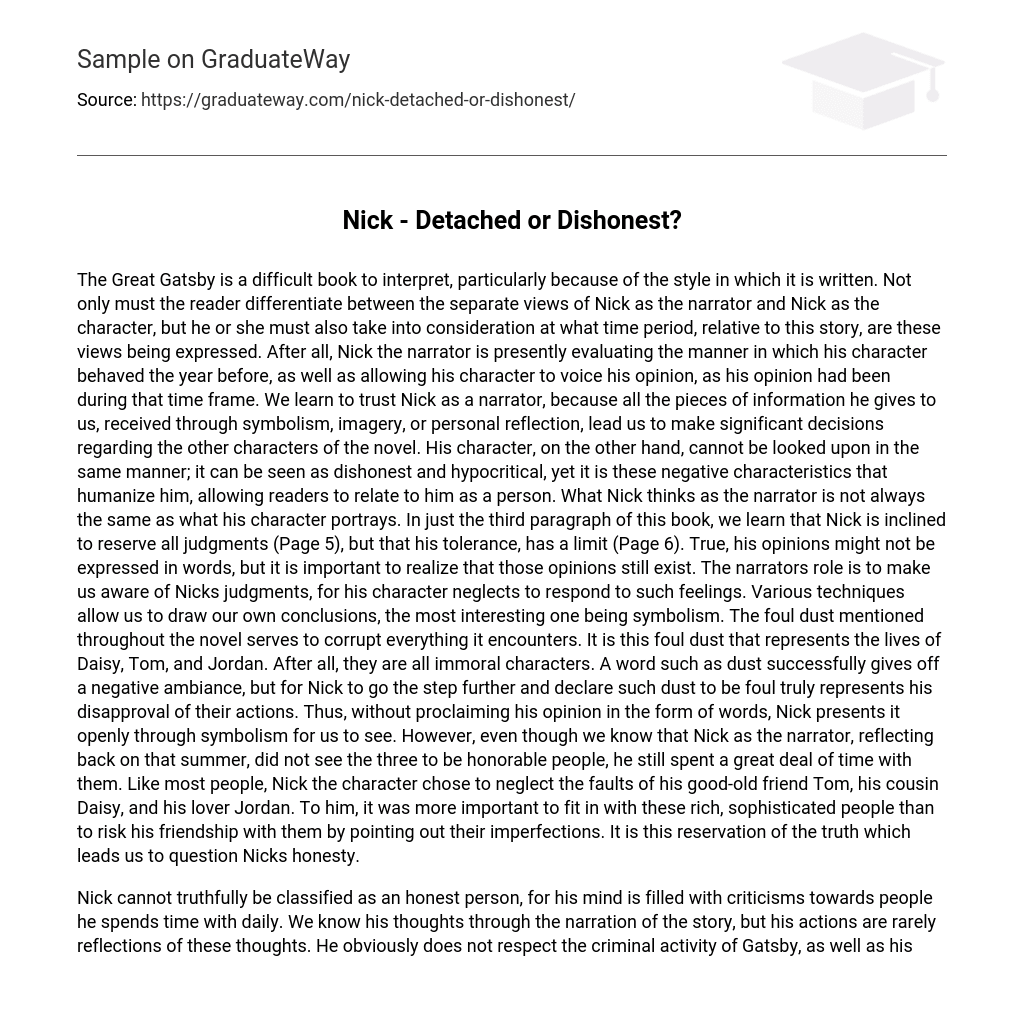The Great Gatsby presents a challenge for interpretation due to its writing style. Readers must not only distinguish between Nick as the narrator and Nick as the character, but also consider the timing of these perspectives in relation to the story.
In this passage, Nick the narrator reflects on his character’s behavior from the previous year and allows the character to express their opinion. As readers, we trust Nick as a narrator because the information he provides through symbolism, imagery, and personal reflection helps us understand the other characters in the novel. However, we cannot view Nick’s character in the same way due to their dishonesty and hypocrisy. These flaws humanize Nick and make them relatable to readers. It is important to note that Nick’s thoughts as the narrator do not always align with what his character portrays.
In just the third paragraph of this book (Page 5), we discover that Nick possesses a tendency to withhold judgments; however, his tolerance does have its limits (Page 6). Though he may not vocalize his opinions, it is crucial to acknowledge their existence. The role of the narrator is to make us cognizant of Nick’s judgments, as he fails to address them directly. Various techniques enable us to form our own conclusions, particularly through symbolism. The pervasive foul dust permeates the novel, corrupting everything it comes in contact with. This foul dust symbolizes the lives of Daisy, Tom, and Jordan.
After all, they are all immoral characters. Nick’s use of the word “dust” creates a negative atmosphere, but his description of the dust as foul goes beyond that, clearly showing his disapproval of their actions. Through this symbolism, Nick openly presents his opinion without explicitly stating it in words. Despite recognizing the lack of honor in the three characters as he reflects back on that summer, Nick still chose to spend a significant amount of time with them.
Like many others, Nick the character makes a conscious choice to ignore the flaws of his longtime friend Tom, his cousin Daisy, and his lover Jordan. For him, maintaining his friendship with these wealthy and refined individuals is more important than risking their relationship by pointing out their imperfections. This decision to withhold the truth raises doubts about Nick’s honesty. Despite having critical thoughts about the people he spends time with on a daily basis, Nick’s actions rarely align with these thoughts. It is evident that he does not approve of Gatsby’s illegal activities or his involvement with Meyer Wolfsheim, who is rumored to have fixed the World Series in 1919.
When Gatsby offers him a job, Nick promptly declines, stating that he is already overwhelmed with responsibilities. Though he declines the offer, Nick continues to support Gatsby and defends him until the end, solely because he is impressed by Gatsby’s immense hopefulness and romantic readiness. Nick is attracted to Gatsby because he is the only person who embodies everything that Nick disapproves of without any pretense or affectation.
Nick admired Gatsby’s positive outlook and determination but did not agree with his moral principles, leading him to decline the job offer. Although Nick silently disapproves of Gatsby’s values, he never directly confronts him. This lack of honesty in addressing his concerns reflects Nick’s passive nature. If he had been sincere, he would have openly shared his opinion. This tendency to withhold the truth aligns Nick with societal norms.
The majority of individuals are not truthful and compromise their honesty to conform with others. However, this is not necessarily negative because it prevents many individuals from getting their feelings hurt if everyone were to constantly highlight each other’s minor flaws. Nicks relationship with Jordan adds an intriguing aspect to this narrative.
It reflects the conflicting emotions experienced by many lovers, torn between self-focus and love. What sets this example apart is that the narrator and character, both portrayed by Nick, are aligned. This is the only occasion when both are in agreement. When examining the narrator’s depiction of his feelings, it can be inferred that Nick did indeed have love for Jordan. Following their argument at the end of the book, Nick storms off in anger, simultaneously half in love with her and deeply regretful.
These are all characteristics of love! After walking away instead of winning her back, Nick is angry and frustrated with himself. He wanted to get Jordan back but was too stubborn. He felt sorry that he couldn’t compel himself to win back Jordan’s affection because he did love her. However, Nick cannot admit to his genuine love for Jordan in his reflections as a narrator. He is acting tough, pretending he is not soft enough to be weakened by emotions.
Despite a man’s reluctance to fall in love, Nick’s admission of feeling a “tender curiosity” can be considered valid. While it may be challenging for most men to admit to love, Nick’s narration allows us to grasp the true meaning behind his words. However, his character’s emotional concealment necessitates reliance on the narrator to unravel the genuine essence of situations. Understanding the distinction between Nick’s narration and character leads to an intriguing realization of how the two aspects complement each other.
The narration brings a fresh perspective to the character’s actions, highlighting the importance of an honest narrator. Despite Nick’s tendency to be hypocritical and reserved in judgment, this trait is what draws many readers to him. Through the narrator’s insights into Nick’s thoughts, readers can connect with his actions as they recognize similar occurrences in their own daily lives. The words describing Nick’s emotions start to resonate with readers, allowing them to truly feel his experiences instead of simply reading about them. As a result, the narrative becomes more engaging and relatable for readers.
Scott Fitzgerald’s writing style allows his character to come alive in the real world, making it easy for readers to connect with Nick’s dishonesty.





